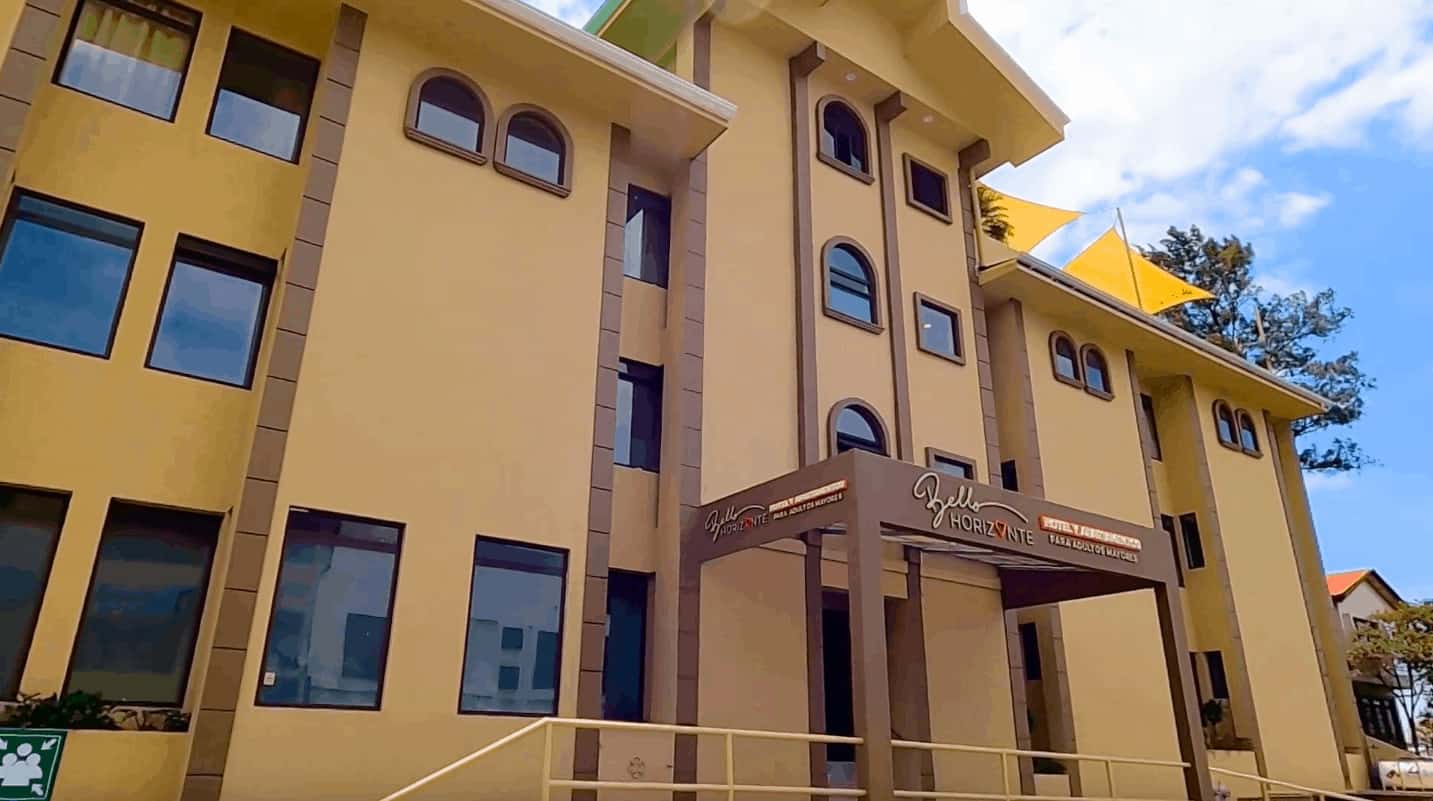Setting a new standard for retirement homes in Costa Rica, the brand-new Bello Horizonte Hotel & Apartments in downtown San José reimagines the often dreary world of elder care with hotel-style comfort, service and food.
Officially opening April 22, the Bello Horizonte offers single-occupancy rooms, private bathrooms, food service five times a day and a full schedule of social and therapeutic activities, making it not only the newest but perhaps the most appealing facility in all of Costa Rica dedicated to caring for people in their golden years.

“We started this to change the concept of care for older adults in Costa Rica,” said Ana Isabel Alvarado Cerdas, director of Bello Horizonte. “This is not an abandonment center.”
Ana thinks of this as a “university for older adults.” She says at many retirement homes, residents sit around watching TV, go out in the garden once in a while and play bingo.
“We go beyond that,” she said. “Our programs and activities are very important to us. We empower older adults. We say, ‘Live your life and forget your age.’ People lose that paradigm that they’re 80 and they’re dying. They decide, ‘I need to live now!’”
A happier alternative
Dean Paquette, the Canadian owner of the facility along with his Belgian wife, Anne Michele, formerly owned the Z Gastro Barbrand in Quepos. But he saw a big need in Costa Rica for a clean, modern, bright elder-care facility as an alternative to the “very sad” retirement homes he has visited, where 30 people may be crammed into one dingy room, with very low staff-to-resident ratios.
Dean first opened Bello Horizonte in Escazú seven years ago, but eventually a larger facility was needed. Last year, the four-story Cocoon Hotel in Barrio Amón came up for sale, and he bought it.
With 44 rooms and a capacity for up to 65 clients, the space problems were solved. And each room had its own bathroom — a big plus for one resident named Luis Roberto Vaglio, who moved from the old facility to the new one.
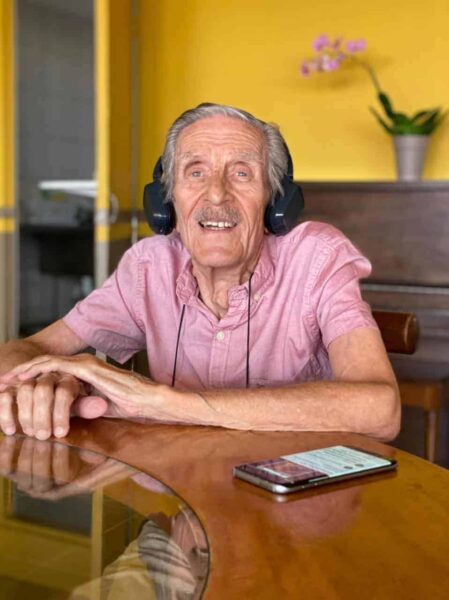
Don Roberto, 79, said, “I’m very happy here, because in Escazú three people had to share a bathroom, but here we have individual bathrooms, which is an enormous improvement. SoI’m very happy with my private bathroom.”
Dean had the old Cocoon Hotel totally renovated. Some 50 bathrooms were refurbished to accommodate people in wheelchairs, and a new wheelchair ramp was built in front of the hotel. More than 60 cameras were installed throughout the facility, giving caretakers 24/7 views into residents’ rooms in case of a medical emergency.
A 70-square-meter fourth-floor terrace with a view of the mountains and the Children’s Museum was built to allow residents to engage in social and therapeutic activities while getting a little sun. A medical clinic was added on the first floor, along with a spa for doing in-house hairstyling, manicures and pedicures. Aging technical, electrical, elevator and water systems were replaced, and the entire building was repainted.
An active lifestyle
Dean and Ana both stress the importance of the therapeutic and social activities that the center offers every day.
“For me, the No. 1 killer of people is the rocking chair — not doing anything,” said Dean. “Continuing to move and exercise your body and your mind is what lengthens your life. … They don’t come to our place to die, they come to our place to live.”
Ana pointed to a busy schedule of activities offered every morning and afternoon, including group and individual therapy, both physical and mental. Social activities include guessing games, board games, card games and equilibrium games (like Jenga), plus movies, music videos, dancing and even karaoke.
“They absolutely love dominoes,” Dean added.
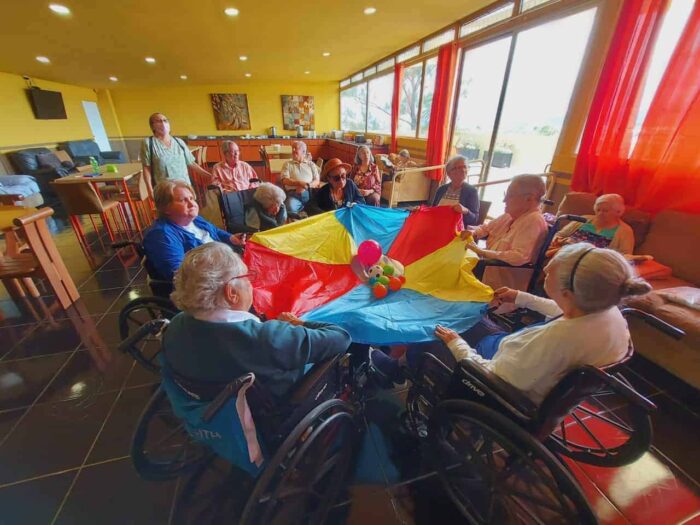
A typical day involves getting up between 6 and 8 a.m. and bathing before breakfast. Some residents are totally independent, while others have assistants to help with basic personal care.
By 8 they’re having breakfast (you guessed it, gallo pinto with all the extras), and at 9 there’s some kind of physical therapy to get people moving, practicing gross and fine motor skills, sometimes in groups and sometimes individually. By 10 it’s time for a snack break.
Lunch is at noon (all meals are served buffet-style). Between 12:30 and 2 is free time, when many residents opt for a nap. At 2, activities are scheduled that are more social and entertaining, and by 3 it’s time for the very Tico custom of an afternoon coffee with sweet bread. Dinner is served from 5:30 to 6:30, and after that, residents have free time to do whatever they want.
Bello Horizonte has a groundbreaking partnership with San José’s College of Nutrition Professionals, developing the ideal meal plans to lengthen the life, energy and brain power of its clients.
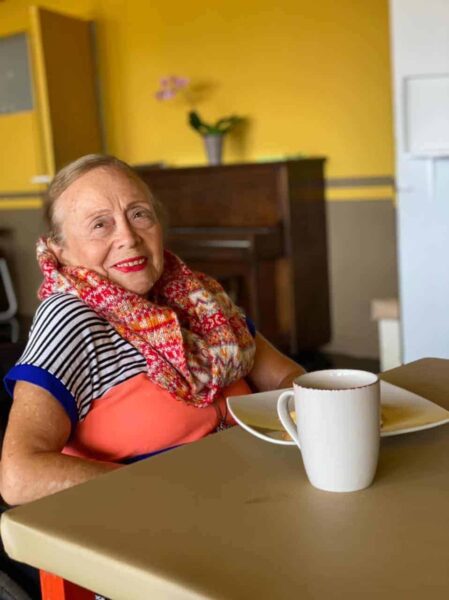
“We’ve started a culture that they don’t stay in their rooms,” Ana said. “We don’t force them to participate in the activities, but they want to.” Ana says that when seniors are at home with a private caretaker, that person may say, “Don’t get up, don’t do this, don’t do that.”
“So they think they can’t do anything,” Ana said. “They can become totally sedentary — they just watch TV, eat and sleep. With our therapy, it’s the contrary. We involve them in daily activities.
“One woman spent two years in a bed — the family thought she was going to die — and now she’s more alive than ever,” shesaid. “We like for our clients to forget their age and live a new life.”
Dean said, “One of the problems is senior citizens sit and don’t move. Yesterday, the caretakers got people up, and they were dancing and singing, even in their wheelchairs, during a live on-site guitar concert. The families say, ‘My brother doesn’t dance.’ Yes, he does, he’s dancing.”
Rooms of their own
Don Roberto, one of the more independent residents here, described his room as “magnificent.” He has a bed, a chest of drawers, a night stand, a closet, a table, a widescreen TV and alittle refrigerator.
He likes his mini-fridge because he says that at dinnertime, he’s not usually very hungry. “But at 8:30 or 9, I eat crackers with salami, ham and cheese,” he said. Not a bad way to spend your time watching your giant TV before bed.
Dean says full-time residents bring their own furniture from home, and they decorate their rooms with their own artwork and family photographs. But the hotel side of the facility, for short-term visitors, provides all the normal furnishings that any hotel would. Most residents have a room to themselves, though in some cases, two people prefer to share a room.
The purchase of the old hotel came with 20 brand-new bunk beds. Dean came in contact with a foundation that provides housing and rehabilitation for street people, called Fundación Lloverá, which had no sleeping accommodations except single beds and yoga mattresses. So he struck a deal to trade the 20 bunk beds for a piano! Now, he says, the residents’ great-grandchildren sometimes serenade the residents with piano tunes.
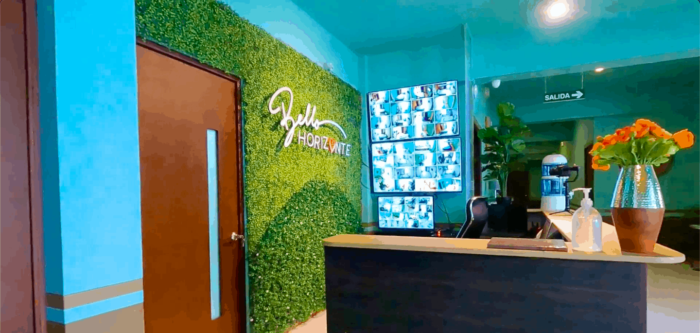
Aging in the time of COVID
The COVID-19 pandemic has posed unique challenges to elder-care facilities, but this one has weathered the storm well.
“We’ve been very lucky,” Dean said. “We’ve had cases of COVID in-house, but we’ve not lost anybody, and we have no cases of COVID now for the past four to five months. All residents and all staff have been vaccinated, myself included. We’re extremely cautious, with very strict protocols in place.”
One unfortunate result of the coronavirus pandemic is a cutback in family visits, as well as in excursions to the outside world. Families can still come to visit, by appointment, but it doesn’t happen as often as it normally would.
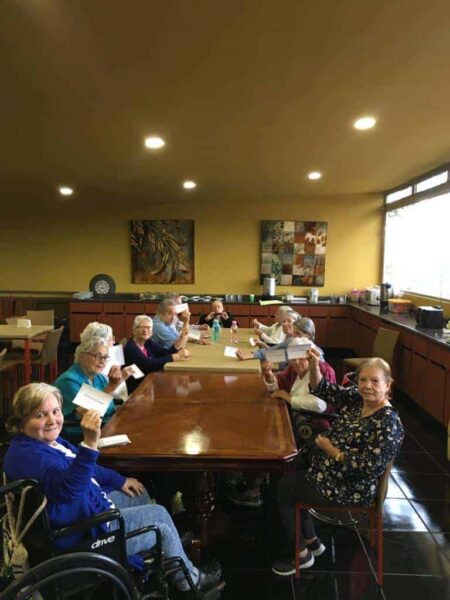
“It’s been a year since I’ve quote-unquote ‘seen’ my family,” said Roberto. “We see each other on WhatsApp, but we can’t have any personal contact. But this Sunday, I’m going to my oldest daughters’ house for a visit with the family.”
Before COVID, the facility used to offer a Friday outing to a park, a movie or a coffee shop, but those outings are now on hold. The problem, Dean said, is that with so many public placesclosed, there’s nowhere to go. He looks forward to the reopening of public spaces so that excursions into town can be offered once again.
Ample staffing
Bello Horizonte has a sizable staff, including nurses, a psychologist, a physical therapist, personal assistants, and food service and housekeeping staff. Currently, there’s one staff member per resident.
The facility has relationships with three doctors, available 24/7, who come there if needed. It also has a contract with Life Support, a 24-hour ambulance service that’s 15 minutes away in case of emergency.
Bello Horizonte also functions as a drop-in center, where an elderly family member can be brought from 8 a.m. to 5 p.m., then picked up again to spend the night at home. Also, if a family is going on vacation, it can bring a senior member of the family to spend three or four days there.
“Normally after three to four days, that person doesn’t want to go home,” Dean said. “So we charge little for that service. Our goal is always to ensure that our client is happy.”
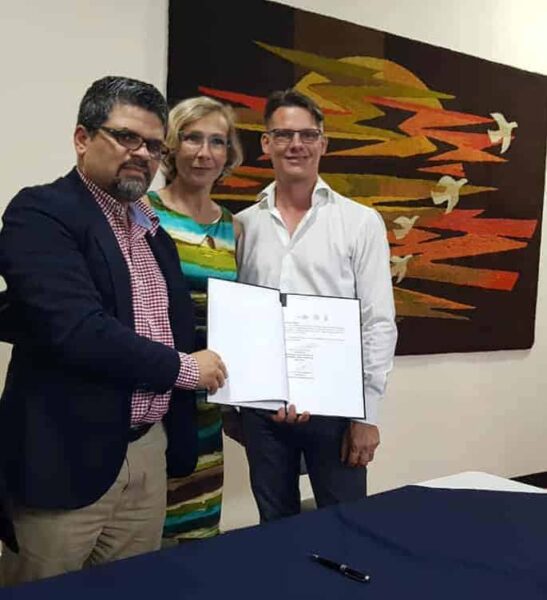
Bello Horizonte also serves as a facility for medical tourists to recover from surgery before flying home. The ages of the residents here range from 61 to 105, though Dean said he wouldn’t turn a post-surgery patient away for being too young.
The center provides daily maid service, cleaning every resident’s room every morning. Laundry service is also provided, and public areas are cleaned and sanitized every night.
Rates can be as low as $1,500 a month for independent adults in single-occupancy rooms, and up to $3,000 a month for those needing full-time care, Dean said.
Bello Horizonte is located in Barrio Amón at Avenida 9 and Calle Central, near the Children’s Museum.
Don Roberto, asked if he has any wisdom to impart to young people from his 79 years of experience, had an interesting answer.
“People normally reject the negative experiences they’ve had in their lives,” he said. “But negative experiences are great teachers, instructing us in how to mold our character, our personality, our way of being. We need to embrace those experiences to evolve.”
For more info, visit https://www.facebook.com/hogarbellohorizonte, email info@hogarbellohorizonte.com or call +506 2256-6442.
This story was sponsored by Bello Horizonte.

